УДК 81’246’243:316.772
Уманець Антоніна
(Кам’янець-Подільський національний університет імені Івана Огієнка)
BILINGUAL COMMUNICATION IN THE PROCESS OF ADEQUATE INFORMATION INTERPRETATION
The article covers some peculiarities of bilingual communication in the process of translation. The research of these phenomena has a large impact in realizing strategies of communication which within anthropological paradigm acquires a particular topicality.
Keywords: bilingual communication, axiological concepts, adequate translation, subjective language constituents, objective language constituents.
Many scholars referring to bilingual communication estimate the role of interpretor (translator) for adequate information interpretation. Adequate translation is based on the necessity to reflect conditions of speech acts, relationships between language parameters and parameters of communicative situation, decoding of any semiotic system, and extralinguistic factors which are either differential or interdependent [1; 3-5]. The research objective of the paper consists in specifying some peculiarities of bilingual communication in the process of translation.
A very important factor in interpreting bilingual communication refers to adequate rendering of the opposition: subjective language constituents versus objective ones. Subjective language constituents are opposed to objective, they are not always subjective, they are not obligatory in any utterance, they change their primary axiological value, they are closely related to each other and communicative intention of a speaker [2, с. 451]. Besides, the existence of this dichotomy is determined by structuring such knowledge fragments as “data base” and involving various cognitive processes which are used for changing different structures of “data base”.
In the process of bilingual communication an interpreter (translator) should have a good command of language signs of a definite semiotic system, and use practical skills to operate them which drew on a variety of individual experience and invariant features of specific language knowledge in the axiological aspects. Adequate translation within lingual communication also must reflect axiological concepts which represent a heterogeneous group of explicators: basic-universal, ethical-philosophic, social and national notions. The boundaries between these notions are conventional, though fundamental national-cultural concepts can be based on untranslatable lexicon which has no equivalents.
The system of national-cultural concepts is implied in the language, consciousness of any ethnocultural society, and determines necessary preconditions of realizing communicative tasks and defining parameters of a communicative situation. The resulting consequences of bilingual communication within adequate translation are decoding nominative content of textual constituents considering regular relationships between language parameters and parameters of a communicative situation.
The system of explicators in bilingual communication acquires different functional and cognitive impact which widens or narrows language and communicative parameters of their content, associative value, and insofar favors intercultural adaptation of bilingual speakers.
ЛІТЕРАТУРА
- Никитин М. В. Основы лингвистической теории значения. Москва : Либроком, 2009. 168 с.
- Рябцева Н. К. Субъективные компоненты речи (к постановке проблемы) Сокровенные смыслы: сб. статей в честь Н. Д. Арутюновой / отв. ред. Ю. Д. Апресян. Москва : Языки славянской культуры, C. 451-458.
- Ellis N. Cognitive approaches to SLA. ARAL, 2012. Vol. XIX. P. 4-28.
- Moore D., Uni K. L’emprunt linguistique comme pont d’apprentissage. Quelques réflexions ă partir de l’étude des emprunts au français, ăl’arabe et au persan dans les languaes turques. Revue japonaise de didactique du franç. Vol. 10. № 2. P. 197-213.
- Muňoz M. R. On Paradigms and cognitive translatology. Translation and Cognition / ed. G. Shreve & E. Angelone. Amsterdam : John Benjamins, 2010. P. 169-187.
